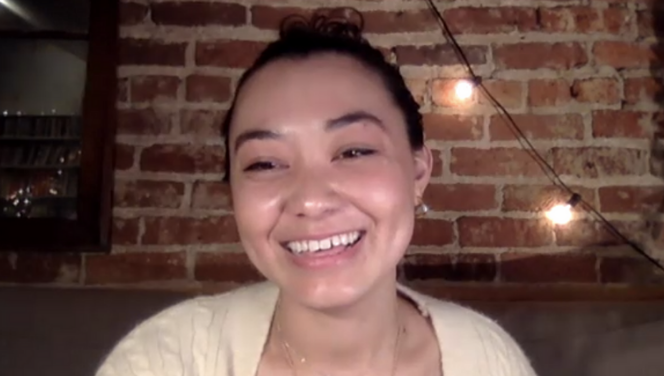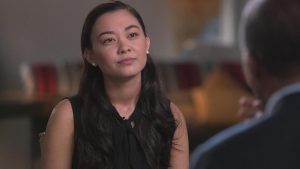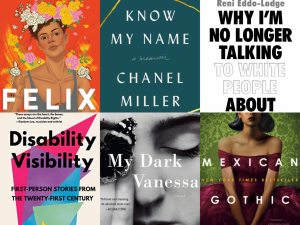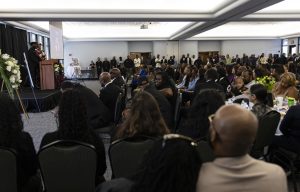NYT Bestselling author Chanel Miller speaks on healing from sexual assault
Author Chanel Miller reads an excerpt from her memoir “Know My Name” during the virtual “Healing Through Storytelling” event on Monday, April 19, 2021. Sacramento State hosted the event for Sexual Assault Awareness Month. Screenshot taken via Zoom by Estefany Nuñez.
April 19, 2021
Content warning: Discussion of sexual violence.
Before Chanel Miller revealed her identity in her 2019 New York Times bestselling memoir, “Know My Name,” she was known as Emily Doe in the Stanford University sexual assault case.
In her book, Miller writes about the emotional journey that occurred after her assault and the course case that led to her assailant receiving a six-month jail sentence and only serving three months.
Sacramento State’s women’s and gender studies department hosted Miller on Monday for its “Healing Through Storytelling” event, being sponsored by My Sister’s House, a nonprofit organization to help Asian and Pacific Islander survivors of domestic violence, sexual assault and human trafficking.
The event was hosted in collaboration with Sac State for Sexual Assault Awareness Month.
Miller said that after her assault in 2015, she was conditioned to be observant and document everything that happened after her assault, though she knew nothing about the court system. Miller said she was glad she was able to center herself so early on in her life while writing her memoir, something she never expected she would do despite her interest in writing.
“In court, I think there’s this expectation to prove that I was good in order to be worthy of care, and when I was writing, I was like ‘I’m really not interested in proving that I’m good,’” Miller said.
Miller said that she did not know how to advocate for herself in court, and when she was told she had a limited time slot to read her victim impact statement, Miller said she did not think to ask for more time and did not realize she was allowed to have boundaries as a survivor.
“I was so obsessed with sort of adapting to the system, just wanting to be good enough,” Miller said.
Miller’s victim impact statement was published after the trial in BuzzFeed under her pseudonym, and the statement went immediately viral after publication. Miller said she had not initially realized how much power she gave the judge to determine her self-worth.
“I do not think they saw me coming in any way, shape or form, and I distinctly remember every time I’d testify, I cried uncontrollably. I was never angry, because I wasn’t allowed to be. I think they perceived me as just polite and a little bit weak. I remember thinking when I would go to the bathroom and I was like wiping off my makeup, even though I felt really crappy and felt a little bit humiliated crying,” Miller said. “I also thought about how probably most of the men in the room would never be able to cry, wail into a microphone into a room full of strangers, you know, and that was power — they just weren’t seeing it as power.”
When asked about how universities and institutional structures are handling sexual assault cases on campus, Miller said that most discussions gravitate towards alcohol and neglect to discuss the environment in which the alcohol is being consumed.
“People will say, ‘Oh, these young kids are just going to parties’, and I’m like ‘Okay, well, and you describe a party, what is the architecture of the party? How is it set up? Who’s deciding who comes in the door and who’s not allowed in? Who’s serving the drinks and what’s in the drinks? There are so many power dynamics already set,” Miller said. “I think Stanford sort of wiped their hands after he [Miller’s assailant] was off campus, instead of addressing him as a symptom, you know, a red flag of a larger issue.”
Miller said she thinks it is the job of a school or institution to not stiffen when being asked to listen to survivors and to listen to their stories with patience, compassion and empathy. She said it is important for anyone listening to survivors to have a responsibility to hold that space to be present and not impose questions or judgements.
“If everyone in the room is prepared to really receive it and absorb it with them and be like, ‘I’m prepared to carry this weight forward with you,’ then they’ll [survivors] feel lighter after telling their story,” Miller said.
Miller said she hopes to continue speaking out about her experiences and opinions to let them be counterweights to negative opinions.
“The victim-blaming [voices] are so strong, and I’ll always figure out any way I can to just show up in any way to combat those voices,” Miller said.
Sac State students can report instances of sexual violence to a confidential campus advocate at WEAVE at (916) 278-5850 or [email protected].
“I think victims have so much information, our stories can tell you a lot about what’s happening, and tell you a lot about the society we’re living in,” Miller said.

































































































































Patricia • Apr 20, 2021 at 7:09 am
Great article, and an important voice on campus to highlight. Personally I’m a little confused why the “assailant’s” name isn’t used in this article. It just perpetuates how men can get away with these horrible behaviors, and it will be forgotten.